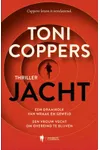Picture a Belgian storyteller who turned Antwerp’s gritty streets into a playground for thrilling mysteries—meet Toni Coppers! Born in 1961, this master of crime fiction has hooked readers with his Inspector Liese Meerhout series, blending taut suspense with rich character depth. His novels, alive with art, intrigue, and human complexity, have not only topped charts but also leaped onto TV screens, cementing his place as a titan of Belgian literature.
With a knack for weaving intricate plots that keep you guessing, Coppers has built a global fanbase. Whether it’s a murder in a Brussels museum or a chilling case in Antwerp’s underbelly, his stories pulse with authenticity and psychological insight. Let’s dive into the life, works, and legacy of this Flemish sensation!
The Making of Toni Coppers
Born on September 6, 1961, in Sint-Truiden, Belgium, Toni Coppers didn’t start as a crime novelist. Initially a travel journalist for Radio 1, he penned literary travel letters, like those in his 1995 debut, De Beha van Madonna. His wanderlust and knack for storytelling shaped his early career, producing vivid radio programs like Gewoonweg and Lopend Vuur. By 2005, Coppers pivoted to fiction with Dixit, a comedic take on communication gurus, but it was his 2008 thriller Niets is ooit that launched him into the crime genre, introducing the world to Inspector Liese Meerhout.
Toni Coppers’s Unforgettable Stories
The Inspector Liese Meerhout series, starting with Niets is ooit (2008), follows a tenacious Brussels art crime inspector turned Antwerp homicide commissioner. This debut novel unravels a murder tied to a missing painting, showcasing Coppers’s love for art and suspense. Engel (2009), the second in the series, dives deeper, with Liese tackling murders mimicking famous paintings, earning praise for its clever art-history twists. Dood water (2014), a fan favorite, explores Antwerp’s dark undercurrents as Liese investigates a priest’s disappearance and a prostitute’s murder, winning the Hercule Poirot Prize. Recently, Een dodelijke biecht (2025), the 21st Meerhout novel, keeps readers on edge with cryptic clues and a chilling church murder.
Coppers’s style is a cocktail of psychological depth, vivid settings, and relentless pacing. His characters, neither purely good nor evil, feel like people you might meet, flawed and relatable. He grounds his stories in real Belgian locales—Brussels museums, Antwerp docks—infusing them with a gritty realism that captivates. Beyond Meerhout, his Alex Berger series, like De zaak Magritte, explores a haunted detective’s psyche, proving Coppers’s versatility in crafting suspense.
Why Toni Coppers Matters
Toni Coppers has redefined Belgian crime fiction, blending literary finesse with edge-of-your-seat thrills. His Inspector Liese Meerhout series, adapted into the 2016 TV series Coppers (also known as Rough Justice), brought Belgian noir to a wider audience, with Hilde De Baerdemaeker’s portrayal of Liese earning acclaim. Awards like the Hercule Poirot Prize, MAX Gouden Vleermuis, and LangZullenWeLezen-trofee reflect his critical success. Coppers’s ability to evolve—moving Liese from art crime to homicide and crafting standalone series—keeps his work fresh, inspiring new voices in the genre.
His global readership, drawn to his universal themes of justice and human struggle, underscores his impact. By rooting his stories in Belgium’s cultural tapestry, Coppers offers a window into Flemish life, making his novels both local treasures and international gems.
- Born: September 6, 1961, Sint-Truiden, Belgium
- Key Works: Niets is ooit, Engel, Dood water, Een dodelijke biecht
- Awards: Hercule Poirot Prize (2014), MAX Gouden Vleermuis (2022)
Snag Dood water or Een dodelijke biecht and dive into Toni Coppers’s gripping world of Belgian noir!
